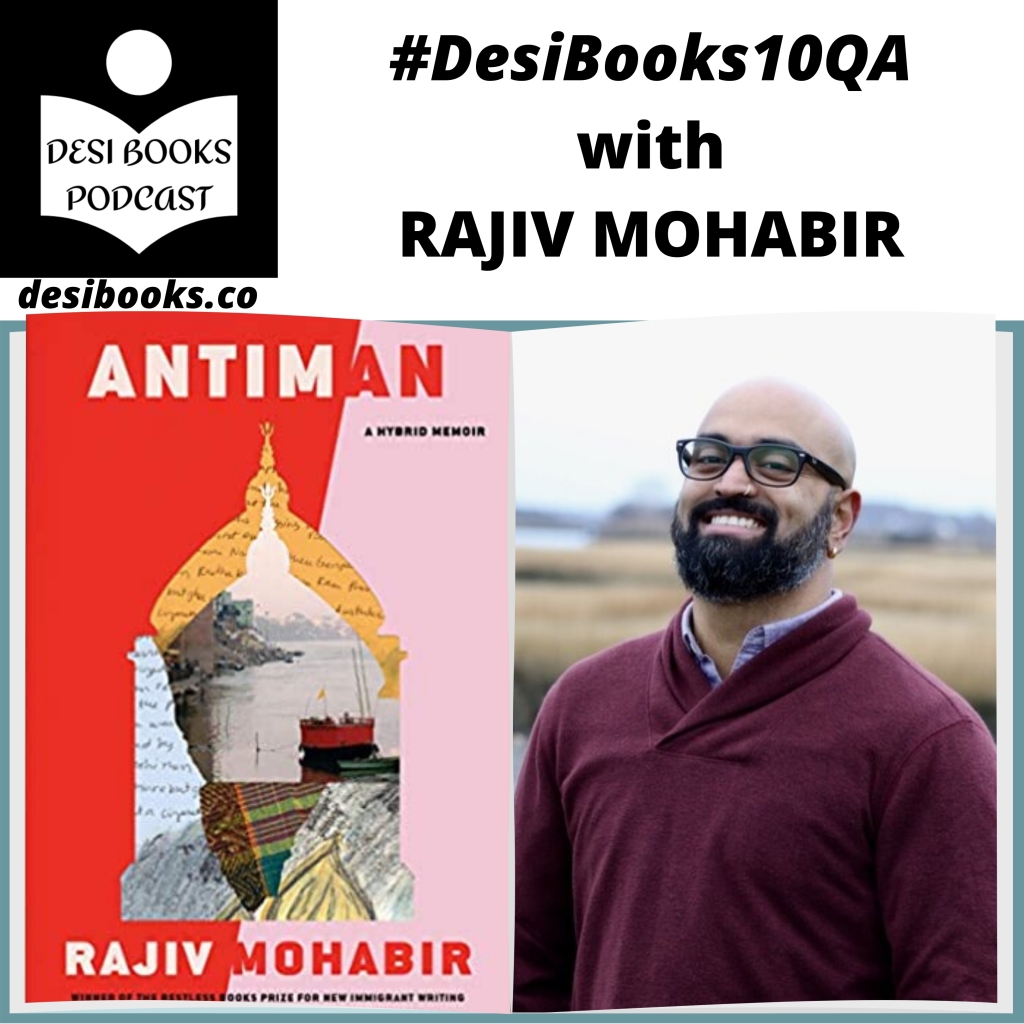
About the author:
Rajiv Mohabir’s memoir Antiman (Restless Books 2021) received the 2019 Restless Books’ New Immigrant Writing Prize. He is also the author of three books of poetry including Cutlish (Four Way Books 2021), The Cowherd’s Son (Tupelo Press 2017, winner of the 2015 Kundiman Prize; Eric Hoffer Honorable Mention 2018) and The Taxidermist’s Cut (Four Way Books 2016, winner of the Four Way Books Intro to Poetry Prize, Finalist for the Lambda Literary Award for Gay Poetry in 2017), and translator of I Even Regret Night: Holi Songs of Demerara (1916) (Kaya Press 2019) which received a PEN/Heim Translation Fund Grant Award and the 2020 Harold Morton Landon Translation Award from the American Academy of Poets. Currently he is an Assistant Professor of poetry in the MFA program at Emerson College, translations editor at Waxwing Journal.
About the memoir:
Growing up a Guyanese Indian immigrant in Central Florida, Rajiv Mohabir is fascinated by his family’s abandoned Hindu history and the legacy of his ancestors, who were indentured laborers on British sugarcane plantations. In Toronto, he sits at the feet of Aji, his grandmother, listening to her stories and songs in her Caribbean Bhojpuri. By now, Aji’s eleven children have immigrated to North America and busied themselves with ascension, Christianity, and the erasure of their heritage and Caribbean accents. But Rajiv wants to know more: where did he come from, and why does he feel so out of place?,
Embarking on a journey of discovery, he lives for a year in Varanasi, on the banks of the Ganges, perfecting his Hindi and Bhojpuri and tracing the lineage of his Aji’s music. Returning to Florida, the cognitive dissonance of confederate flags, Islamophobia, and his father’s disapproval sends him to New York, where finds community among like-minded brown activists, work as an ESL teacher, and intoxication in the queer nightlife scene. But even in the South Asian paradise of Jackson Heights, Rajiv feels like an outsider: “Coolie” rather than Desi. And then the final hammer of estrangement falls when his cousin outs him as an “antiman”—a Caribbean slur for men who love men—and his father and aunts disown him.
But Aji has taught Rajiv resilience. Emerging from the chrysalis of his ancestral poetics into a new life, he embraces his identity as a poet and reclaims his status as an antiman—forging a new way of being entirely his own. Rapturous, inventive, and devastating in its critique of our own failures of inclusion, Antiman is a hybrid memoir that helps us see ourselves and relationships anew, and announces an exciting new talent in Rajiv Mohabir.
“Rapturous, inventive, and devastating in its critique of our own failures of inclusion, Antiman is a hybrid memoir that helps us see ourselves and relationships anew. . .” ~author Rajiv Mohabir featured on #DesiBooks10QA .@desibooks
Tweet
1. The desi book that made you want to be a writer (or changed your life.)
Rooplall Monar’s Koker, poems by Mahadai Das, Coolie Odyssey by David Dabydeen. So often, Caribbean literature is not read as “desi.” To me, these were the Caribbean poets and writers that cleared space for me to write and publish in this country.
2. The desi book that your own latest book is most in conversation with and why.
The book that Antiman is most in conversation with Secrets We Kept: Three Women of Trinidad by Krystal Sital. It’s a memoir about three generations of women in her family and a lot of the dialogue is written in Trinidad Creole English. It’s a risk that she took and she produced a book of such honesty beauty that reading it helped me think through the genre.
3. The desi book that doesn’t exist (to your knowledge) but you’d love to read.
I would love to read a book about the migration of queer indentured laborers into the colonies in the time of 1838-1917. I would also really love to read a book about the folk songs that they brought with them in Tamil as well! There are so many resources about the North Indian languages that the South Indian ones are seldom talked about. I want to know about Guyanese Tamil songs and death celebrations—their colors and metaphors.
“So often, Caribbean literature is not read as “desi.” To me, these were the Caribbean poets and writers that cleared space for me to write and publish in this country.” ~Rajiv Mohabir #DesiBooks10QA .@desibooks
Tweet
4. The desi book that you’re currently reading or planning to read soon.
The Archer by Shruti Swamy! Her short stories in A House is a Body are stunners and sent me into considering the potentials of tension in the form. The Archer will be her first novel.
5. The desi book that you believe is most under-appreciated and why.
Quarantine by Rahul Mehta. This collection of short stories was very important to me when I first read it. What I loved about it was that I could see that every story’s protagonist was a queer South Asian. I showed it to my mother and she was amazed that there were (brown) folks brave enough to write about their experiences as queers! My sister borrowed my first copy and refused to give it back!
6. What’s the best writing advice you’ve ever received?
The best writing advice that I’ve been given was that the long game of publication takes tenacity. That kind of patience was a trial-by-fire for me but I’m glad to say that, despite a system rigged against someone like me, I was able to emerge.
7. While writing your latest book, how did you keep yourself motivated to keep going despite setbacks (if any)?
I kept myself motivated by being in conversation with my younger self. I thought about what it would mean to that Rajiv to know that I was intent on writing down what happened to him. He was kind of like my guide through the emotional weight of the memories.
I also felt the presence of my Aji as I wrote this book and felt as though I was also talking to her as I listened to my recordings of her. I was transcribing and translating songs that she learned from her mother and that, supposedly, had roots in her own mother’s mother’s voice. By the time I was told that there was no space in the literary publishing world for a queer brown voice, it slid off my back. I thank goodness that there was a louder, more intimate voice speaking to me from across generations.,
#WritingTip from Rajiv Mohabir: “…the long game of publication takes tenacity. That kind of patience was a trial-by-fire for me but […] despite a system rigged against someone like me, I was able to emerge.” #DesiBooks10QA .@DesiBooks
Tweet
8. With this latest book, what does “literary success” mean to you?
“Literary success” is something that I’ve had to come to define on my own terms again and again, as we all must do. I think that publishing a book that is so hybrid in language, with queer themes and forms, is success in itself.
I’ve started to judge my own success after several queer, desi, and Indo-Caribbean people reached out to me and said that they were moved by and felt seen by Antiman—what greater honor is there? To me, reaching these people feels like I’ve achieved much already and I’m so humbled and grateful that this book found a place in their hearts.
Another success is that my books are available in public libraries where there are many Caribbean and South Asian people: New York, Ft. Lauderdale, Orlando, and Toronto.
9. How have larger literary citizenship efforts or the writing community helped you with this latest book?
I am so grateful to everyone who has mentioned my book or who has been instrumental in placing interviews and reviews and blurbs out there. I am completely stunned by how much support people have offered me and I would say that, without them, this memoir would not be faring half as well as it is! I am also lucky to have people who read earlier drafts of this book and believed in it and in me and that the story was moving and worth being written.
10. What would you most like readers to take away from this latest book?
I think if people came away with learning a little more about how diverse the South Asian diaspora is, that would be fantastic. There are so many intersecting identities at play: Creoleness, queerness, multi-religious configurations—there is no real homogeneous “South Asian Americans” group. Indo-Caribbean people exist even with diversity in our own groups.
The heart lesson is truly the epigraph by the poet Kabir that says:
“Reading countless books, the world died—
no one mastered anything.
A few words of love,
if you read them, will make you wise.”
The heart lesson is the epigraph by the poet Kabir: “Reading countless books, the world died—no one mastered anything. A few words of love, if you read them, will make you wise.” ~Rajiv Mohabir on his hybrid memoir, Antiman, for #DesiBooks10QA .@DesiBooks
Tweet
Rajiv Mohabir’s Antiman is out now. More on Rajiv’s website.
